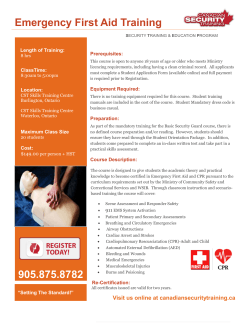
All Thanks to a Broken Fibula: Profile of Phil Sweeney
All Thanks to a Broken Fibula Phil Sweeney has a broken fibula to thank for his career as a physiotherapist. As a kid in New Zealand, Phil broke his leg while playing rugby. It took three months for his leg to heal, which included six weeks of physiotherapy. He recovered just in time for a rugby trip to Australia. To a young Phil, physiotherapy seemed like a pretty neat thing to do. Phil Sweeney is Regional Physiotherapy Educator for VCH “I wanted to help people and I enjoy the challenge of seeing a patient and trying to figure out what’s going on with their body, then trying to correct any issues and weaknesses,” says Phil, who became a physiotherapist 12 years ago. Today, he is a well-known face around VCH as Regional Physiotherapy Educator. He’s still as fascinated by the profession as he was in those early days, but there’s always room for improvement. That’s why he’s looking forward to benefits the Clinical & Systems Transformation (CST) project will bring about. Phil got involved with the project as a subject matter expert with the Clinical Documentation design team. “I like playing with technology, so the idea of participating in the development of electronic records was quite appealing to me. On top of that, I have a strong belief in good practice for physiotherapy and I figured it was a good chance to get involved and help develop the physiotherapy documentation.” Phil adds that CST will save staff time, letting him and his colleagues spend more time with their patients. He says it can be frustrating searching for a patient’s chart, or waiting for someone to be done with it. Through CST, anyone who’s caring for a patient will have immediate access to their chart via the new shared clinical information system. Another huge benefit Phil sees is ensuring access to legible documentation, because everything will be entered in the system. “Everyone is going to be able to read what everyone else is writing,” he says. In addition to having a powerful new system, we’re also streamlining care by creating standardized, evidence-informed clinical practices for use across VCH, PHSA and PHC. Phil says helping create these standard practices has been fascinating. “It’s been a really worthwhile process taking three organizations, looking at the way we all do things and finding standard practices we should be holding ourselves to.” Background information • • CST is a joint initiative of VCH, PHSA and PHC, and one of the largest and most complex healthcare projects in Canada. It spans across several areas of the continuum of care including: acute care inpatient and outpatient units and ambulatory care. As well as creating consistent, leading practices, and a shared clinical information system, CST will deliver HIMSS Level 5 functionality. Clinical design teams, made up of hundreds of highly-skilled, multi-disciplinary professionals from across the three Health Organizations, started work on April 7, 2014. These teams are tasked with designing our future workflows, based on leading practices. In doing so they are defining the requirements for our new clinical information system. Website: CSTproject.ca Email: info@CSTproject.ca CST Executive Directors & Transformation Leads: VCH: Donna Stanton, Donna.Stanton@vch.ca PHSA: Vicky Crompton, Vcrompton@phsa.ca PHC: Grant McCullough, GMcCullough@providencehealth.bc.ca Chief Medical Information Officers: VCH/PHC: Eric Grafstein, Eric.Grafstein@vch.ca PHSA: Alain Gagnon, Alain.Gagnon@phsa.ca
© Copyright 2025










